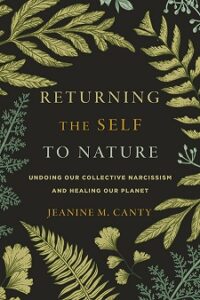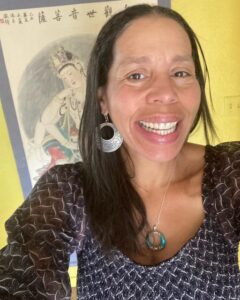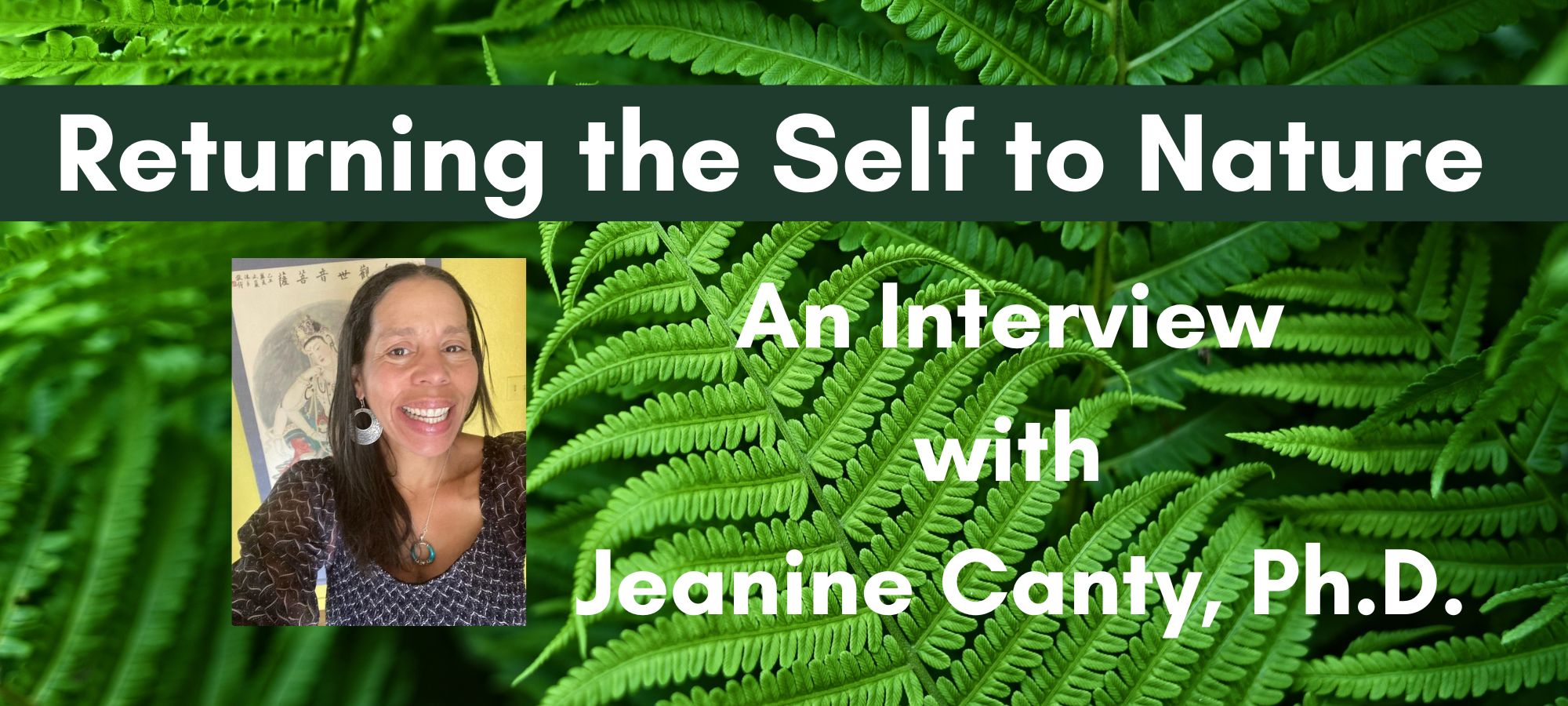Jeanine Canty, Ph.D., is the author of Returning the Self to Nature: Undoing Our Collective Narcissism and Healing the Planet and many other publications. Her teaching intersects issues of social and ecological justice connected to the process of worldview expansion and positive change. She will be co-teaching Pacifica’s “Advanced Training Certificate: Ecopsychology” January 26, 2024 – April 20, 2024. I’m delighted to speak with Jeanine about the certificate and ecopsychology.
Angela: The Advanced Training Certificate in Ecopsychology will be taught by four scholars of renown in the field, including you. Your first lecture covers “From Ego to Ecological Self,” which posits that “A key need is for individuals within our society to develop from the small ego to the ecological self.” Obviously, ego is one of the key concepts discussed in psychology, often times described as arrogance or self-focus, and other times celebrated as a needed component to function well. When you approach the topic of ego within ecopsychology, how are you using the term and how is it related to the ecological self?
 Jeanine: When we’re in a healthy state, the ego is just a rational organizational principle, a part of ourselves that does basic functions. And when we’re talking about ego more in a meme or archetypal sense, we’re talking about the overblown ego. In terms of ecopsychology, we’re talking about the problematic ego where people see themselves as individuals who need to be the most good looking, the smartest, the most successful, etc. This kind of irrational ego makes our self-concepts much bigger than they should be. The ecological self is redirecting that and reminding us that we’re just one species among so many and one being amongst an infinite number of beings within the universe. The ecological self teaches us how to be in relationships with more than our small sense of self, perhaps with our connection to a squirrel, a body of water, a tree, our whole ecosystem. When we have some affinity for things like this, we realize our sense of self is bound up with this being and is expanded in a way that is not self-centered.
Jeanine: When we’re in a healthy state, the ego is just a rational organizational principle, a part of ourselves that does basic functions. And when we’re talking about ego more in a meme or archetypal sense, we’re talking about the overblown ego. In terms of ecopsychology, we’re talking about the problematic ego where people see themselves as individuals who need to be the most good looking, the smartest, the most successful, etc. This kind of irrational ego makes our self-concepts much bigger than they should be. The ecological self is redirecting that and reminding us that we’re just one species among so many and one being amongst an infinite number of beings within the universe. The ecological self teaches us how to be in relationships with more than our small sense of self, perhaps with our connection to a squirrel, a body of water, a tree, our whole ecosystem. When we have some affinity for things like this, we realize our sense of self is bound up with this being and is expanded in a way that is not self-centered.
Angela: Your most recent book is Returning the Self to Nature: Undoing Our Collective Narcissism and Healing the Planet. When I hear the term narcissist, I think of the often-described codependent connection between narcissists and empaths, pop psychology terms like love-bombing, devaluing, and gaslighting. But the most basic premise is that the narcissist uses other people as a source of fuel. So I am very curious as to how narcissism is treated in your book in the context of healing the planet, as the term implies something deeper than arrogance or thoughtlessness, but rather something pathological.
Jeanine: The book isn’t about people who have narcissistic personality disorder, but rather it takes some of the negative traits of narcissism, like arrogance, entitlement, an inability to feel shame, and the lack of empathy and sees that this is a collective meme for western societies. That fierce sense of individualism and unbridled capitalism means that we’re constantly living the life of the self, especially on social media, and having less compassion for other people and little to no sensitivity to all sentient beings and what’s happening to Earth. The first step is awareness that there’s a problem, the ecological and social crisis, and then getting into the practices that allow us to move from self-centeredness to deeper levels of care, empathy, and union.
Angela: You will be teaching not only about ego and nature, but social justice and incorporating multiple perspectives. The course description says that each of these classes will “require a willingness to work with difficult emotions, compassion, and mindful change.” What kind of experience can participants expect? Will this be a therapeutic process of transformation?
Jeanine: There will be lots of readings and lecture to engage this work, and we’ll do some practices during our calls and I create meditation and experiential guided videos for participants. The caution about willingness to work with difficult emotions is given because a lot of this information can be triggering. We’re critiquing our western lifestyles and looking at the realities that happen when we oppress people of color, women, indigenous people, and Earth, and the fallout that happens there. We look at systems of white supremacy and how even those who are supposed to benefit from it aren’t really benefitting. We work with our worldviews to make them more pliable and more aligned to work with the problems of our complex world.
Angela: You are both editor and a contributor to the book Ecological and Social Healing: Multicultural Women’s Voices as well as Globalism and Localization: Emergent Approaches to Ecological and Social Crises. How do gender and diversity inform emergent approaches to these crises? And does this lean toward the notion of radical ecopsychology, that considering psyche and nature without taking society into the equation, will veer away from the aspect of social justice that is needed to have a lasting impact?
Jeanine: Most of my work centers around the assumption that the oppression of Earth and the oppression of people go hand in hand, and we can’t take any large-scale instance of oppression and not see direct connections to the oppression of Earth. Ecological and Social Healing: Multicultural Women’s Voices looks at how women and/or those who embody the feminine have a deeper acuity to attend to these issues rather than people who benefit from these oppressive structures. Women of color and indigenous women are not part of white supremacy and therefore have more heightened experiences of environmental injustice and how that impacts their communities. There are a lot of indigenous women with first-hand experience with oppression within their communities, people who have been colonized by these systems of white supremacy yet are not part of it.
Angela: How do you envision the evolution of ecopsychology, given that it is a relatively new field, and the current moment is particularly fraught with social, political, and ecological concerns? Which is to say, what would you most like to see happen in terms of growth and healing?
Jeanine: I’m in solidarity with social justice. We have problematic egos, which is a relatively new thing in the history of humanity. We haven’t really trained it or used it well, so a lot of the work of the future is bringing us back into balance with our somatic, sentient selves, our ecological selves, moving from being individuals controlling things and entering into a paradigm that’s about the “We.” People are sick of struggling on their own and want to surrender to something greater that still allows them to be unique and gifted, but not in a competitive way, weaving together the magic of being a sentient being. We see that in subculture movements, people wanting to surrender and commune, and I think we’re going to see that more and more.
Join us for Pacifica’s “Advanced Training Certificate: Ecopsychology,” January 26, 2024 – April 20, 2024

Jeanine M. Canty, PhD, is a professor within the Transformative Studies Doctoral program at the California Institute of Integral Studies (CIIS) in San Francisco, working from a distance via the foothills of Boulder, CO. Previously, she was a professor of Environmental Studies at Naropa University, a Buddhist inspired institution, started her teaching career as a core faculty at Prescott College, an experiential learning institution. She has a doctorate in Transformative Learning and Change from CIIS, an MA in Cultural Ecopsychology from Prescott College, and a BA from Colgate University in International Relations. A lover of nature, justice, and contemplative practice, her teaching intersects issues of social and ecological justice connected to the process of worldview expansion and positive change. She is both editor and a contributor to the book Ecological and Social Healing: Multicultural Women’s Voices as well as Globalism and Localization: Emergent Approaches to Ecological and Social Crises. Her most recent book is Returning the Self to Nature: Undoing Our Collective Narcissism and Healing the Planet (Shambhala Publications, 2022). Jeanine is also a certified meditation instructor as well as a Wilderness First Responder (WFR).

Angela Borda is a writer for Pacifica Graduate Institute, as well as the editor of the Santa Barbara Literary Journal. Her work has been published in Food & Home, Peregrine, Hurricanes & Swan Songs, Delirium Corridor, Still Arts Quarterly, Danse Macabre, and is forthcoming in The Tertiary Lodger and Running Wild Anthology of Stories, Vol. 5.


